An artist can show his or her talent in the best possible way, not only with creativity but also with the right equipment. Likewise, web development is an art, and without proper tools, you can’t turn your vision into reality. Node.js and Django are both powerful backend technologies that can help you bring your vision come alive.
Node.js is a cross-platform runtime environment used to build efficient and fast web apps. It is based on JavaScript and can run both on the client-side as well as the server side. On the other hand, Django is a cross-platform, high-level Python framework.
Though Node.js and Django are both used to develop web applications, they are unique in their ways. In this blog, you’ll see a comparison of Node.js vs. Django based on factors like programming, architecture, security, and performance.
Comparison Overview: Node.js V/S Django
Before we compare the two technologies, you must understand the key features that set them apart.
| Differentiators | Node.js | Django |
| Base language | C, C++, and JavaScript | Python |
| Architecture | A run-time environment that works on an event-driven model | Model-template-view architecture works with handling data |
| Complexity | Better performance due to flexibility provided to developers | Little more complex because developers have to follow a fixed path/practice to solve problems |
| Performance | Less complicated system, and more flexibility for developers | High-performance framework due to built-in template system |
| Scalability | Advanced scalability | Comparatively less scalability |
| Tool type | Runtime environment | Web framework |
| Security | Comparatively comes as less secure built-in tools, but manual operations cover the security deficiency | Comes as a more secure tool compared to NodeJS, the built-in system prevents from security threats |
| Flexibility | More flexibility due to the rich ecosystem, giant JavaScript library, | Limited availability of tools and features, comparatively follows a strict approach |
| Development speed | More operating time but is helpful if developers are influential and experienced in JavaScript | Less operating time due to built-in system, time-consuming in learning if developers don’t know python |
What is Node.js?
Node.js is a cross-platform JavaScript run-time environment that allows you to build scalable and fast web applications. It is open-source and executes the JavaScript code outside the browser with a non-blocking I/O model. This makes Node.js lightweight and improves system efficiency in processing user requests.
Node.js provides a pre-built package manager called npm, which helps you access several modules and libraries. Further, it runs on many different operating systems like Windows, Linux, macOS, and more.
Here are some market usage stats of Node.js as a backend technology:
- NodeJS is one of the most used frameworks by software developers worldwide, with 47.12% usage.
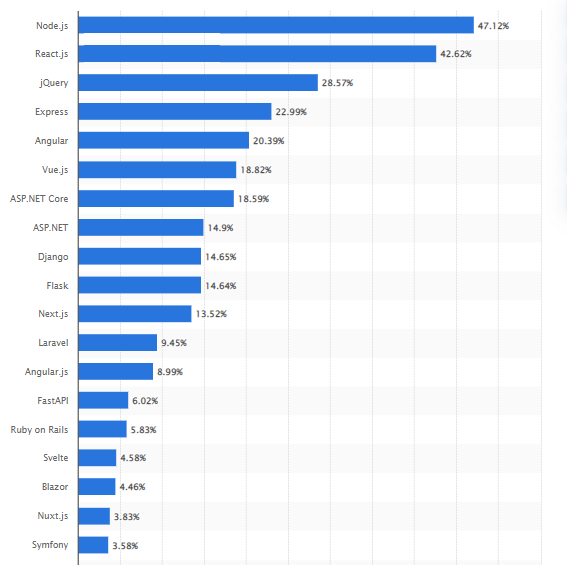
- Node.js is used by 2% of all websites worldwide.
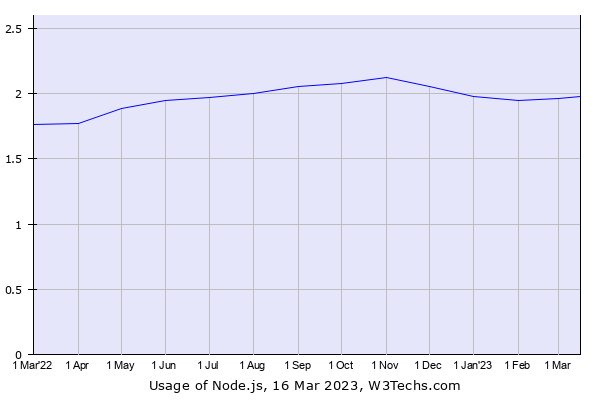
- At least 30 million websites use Node.js, which makes it one of the most-used frameworks.
- 43% of NodeJS developers are using it for Enterprise applications.
Use cases of Node.js
- Content streaming web apps
- Live streaming applications and dynamic software
- Single page applications
- IoT-based applications
- ECommerce apps with peak loads
Popular apps using Node.js as backend technology
- NASA used Node.js as a backend and migrated data from legacy databases to a cloud database. It created a single database for every query and improved the data access time by 300%.
- Twitter leveraged Node.js to develop and deploy a lighter version called Twitter Lite with a 30% faster time-to-market.
- Netflix migrated from Java to Node.js for the backend and decreased app startup time from 40 minutes to 60 seconds.
What is Django?
Django is a framework based on Python which you can use to create high-performance web applications. It provides reusable components which you can use to implement the DRY (Don’t Repeat Yourself) approach.
Further, it provides ready-to-use features like a login system, database connections, and CRUD operations. Django uses an MVT (Model View Template) design pattern where the model part handles the data requests, the view part acts as a request handler, and the template is an HTML file with logic to display data.
Using the MVT pattern, Django defines the structure and behavior of the data you store through the website.
Here are some market usage stats of Django as a backend technology:
- A total of 83,237 websites use Django worldwide.
- Django has 6% of the market share compared to other web application frameworks
- According to a report, Django is the second most popular backend framework with 67.941 repository stars.
- Django powers more than 49,000 unique domains across the internet.
Use cases of Django
- Web apps with the object-oriented model (ORM)
- Development of API backend
- Need for a scalable application
- Integration of Machine Learning algorithms
- Developing data-driven applications
Popular apps using Django as backend technology,
- Disqus build its blog comment-hosting service on Django. It handles 50 million comments and 17 billion pageviews from 2 billion unique visitors across 191 countries monthly.
- Spotify uses Django to provide millions of users with a seamless experience of streaming music with the integration of ML algorithms.
- Dropbox used Django and added features like ser history, synchronization accounts across different devices, various file-sharing options, etc.
Learning curve in Node.js vs Django
Node.js
Is this your first rodeo with Node.js? Fret not! The syntax of this language facilitates writing scripts for simple applications. The learning curve to build a complete web application might seem steep because you’ll need to understand Node’s architecture, asynchronous programming, and native methods.
But if you already know Javascript, it becomes easier to get started with Node.js because of the similar syntax. However, you may find yourself spending more time developing due to the complexities of Node.js itself.
Django
Much like Node.js, Django can be learned quickly. Moreover, if you’re already familiar with Python, this framework will only come naturally to you. However, to work with Django, you’ll need to understand the methods and features that come out-of-the-box and the framework’s MTV architecture.
The framework follows a strict approach to following them throughout the development. Additionally, it allows you to do more work with less code, saving you a lot of time. Django offers excellent documentation and a community to help you through the hiccups.
Learning Curve- Django > Node.js
Both the web framework would require the base knowledge of the respective languages. However, Django is easy to learn, and Node is difficult for beginners due to the complexity of syntax.
The Architecture of Node.js vs Django
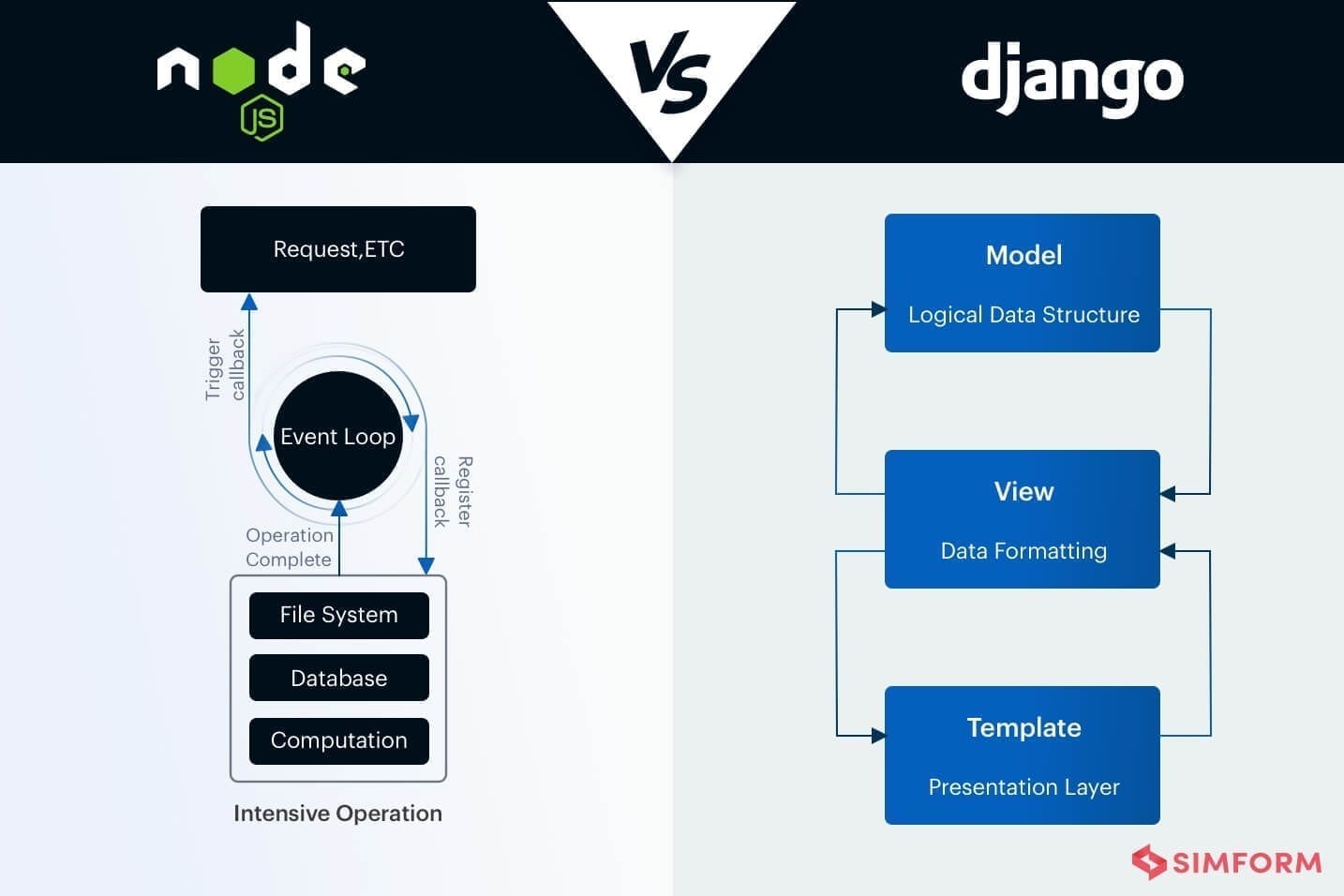
Node.js
Node.js architecture is distinct among other server-side platforms; its single-thread event loop architecture helps build high-end applications. This server-side runtime environment offers robustness to the applications built with it, making them available for processing requests without delays because of its non-blocking input/output and asynchronous request handling architecture.
- Handling multiple concurrent requests is easy and fast in Node.js. It helps applications process various requests/operations simultaneously, resulting in more immediate responses to the app users/ client requests.
- Single-threaded applications- no context switching between the threads help to reduce reloads and overall overhead time.
Django
Django is Model-Template-View based architecture. The web framework comes with several advantages that help build apps faster, better, and advanced.
- Faster development- developers can work on multiple modules of a single project simultaneously, making the framework a rapid development platform for web apps.
- The component-based pattern of the framework helps give ease to modification. One change in a component does not affect the entire application or other components.
Architecture- Node.js = Django.
Node.js architecture is designed to process multiple requests simultaneously. At the same time, Django’s architecture provides a solid foundation for building scalable, secure, and maintainable apps.
Security in Node.js vs Django
Node.js
Since Node.js doesn’t offer default security settings, your developers may have to walk a few extra miles to add security measures to ensure your application is secure. This step is important as the default session cookie names used by the framework could expose your application to the attacks.
In addition to this, your application may be vulnerable to various attacks like Cross-Site Scripting(XSS), Cross-Site Request Forgery (CSRF), SQL Injection, among others.
Django
Conversely, Django takes security very seriously. It sanitizes its input to prevent malicious injection through the input fields of the web application. It also safely handles SQL queries to block SQL injection attacks. Some of the security features Django provides are:
- Cross-site scripting (XSS) protection
- Cross-site request forgery (CSRF) protection
- SQL injection protection
- Clickjacking protection
- SSL/HTTPS
- Host header validation
Security-Django >Node.js
If your web application deals with sensitive information, Django is preferable. However, that doesn’t mean Node.js isn’t a safe option. It’s just that you may need to add some extra hours and a little more effort to protect your application.
It’s just that you may need to add some extra hours and a little more effort to protect your application.
Templates and Documentation in Node.js vs Django
Node.js
Node.js is a developer-friendly tool. With the flexibility to design and customize templates, it has become a preferred tool for experienced developers. But the downside is that the beginners find it challenging to get things right at first. Another challenge is that it takes more time to build an app since you have to start building an app from scratch. It will also be essential to invest your time searching for implementation modules and a separate time for their testing.
For cases where adequate time is not given, there is a possibility of not receiving reliable outcomes. For a team working on Node.js projects should make sure somebody in your group is exceptionally experienced with Javascript, experience working with Node.js would surely be a plus.
Django
Django has a built-in templates system. Anyone with HTML understanding can go along well with this without having to understand python programming. It could be helpful for beginners, as the development process becomes faster due to the ready-made availability of templates.
However, it doesn’t give you the flexibility to design everything from scratch, unlike Node.js.
Templates & documentation- Django & Node.js
Django with Python at its core is better if you are a beginner because it does not require creating templates from scratch. Node.js, on the other hand, is a better choice if you are looking to customize templates.
Customization in Node.js vs Django
Node.js
Node.js is a highly customizable technology that puts you on the driver’s seat from the word go. Since you’ll be building everything from scratch, you can control how your web application is made and how it works. This characteristic is most loved by experienced Node.js developers who are passionate about building different web applications and exploring the many features of Node.js.
Django
Django has a lot more to offer with its vast template and library system. It is reducing a lot of work in development. But there’s a loophole; you can not build apps with more scalability, which requires a structure like other MVC frameworks. It has limited scope for flexibility and customization. The architecture is model-template-view-based; there’s a little scope to build apps with Model-view-view-model architectures, and apps yielding more customization attributes and scratch requirements.
Customization- Node.js > Django
If you are looking to build custom web applications with no restrictions on the architecture, Node.js is for you. But if you are not bothered by a customized web app and are just looking for a quick way to do it, you could choose Django.
Scalability in Node.js vs Django
Scalability pertains to developing apps considering the future scope to build features and functionality while handling many users/customers. A scalable solution is customizable, able to add new functionalities and open for addressing a tremendous amount of client requests, updates in real-time, and an increase in workload.
While Node.js and Django are preferred frameworks to build desired apps, let’s check their ability to build scalable apps.
Node.js
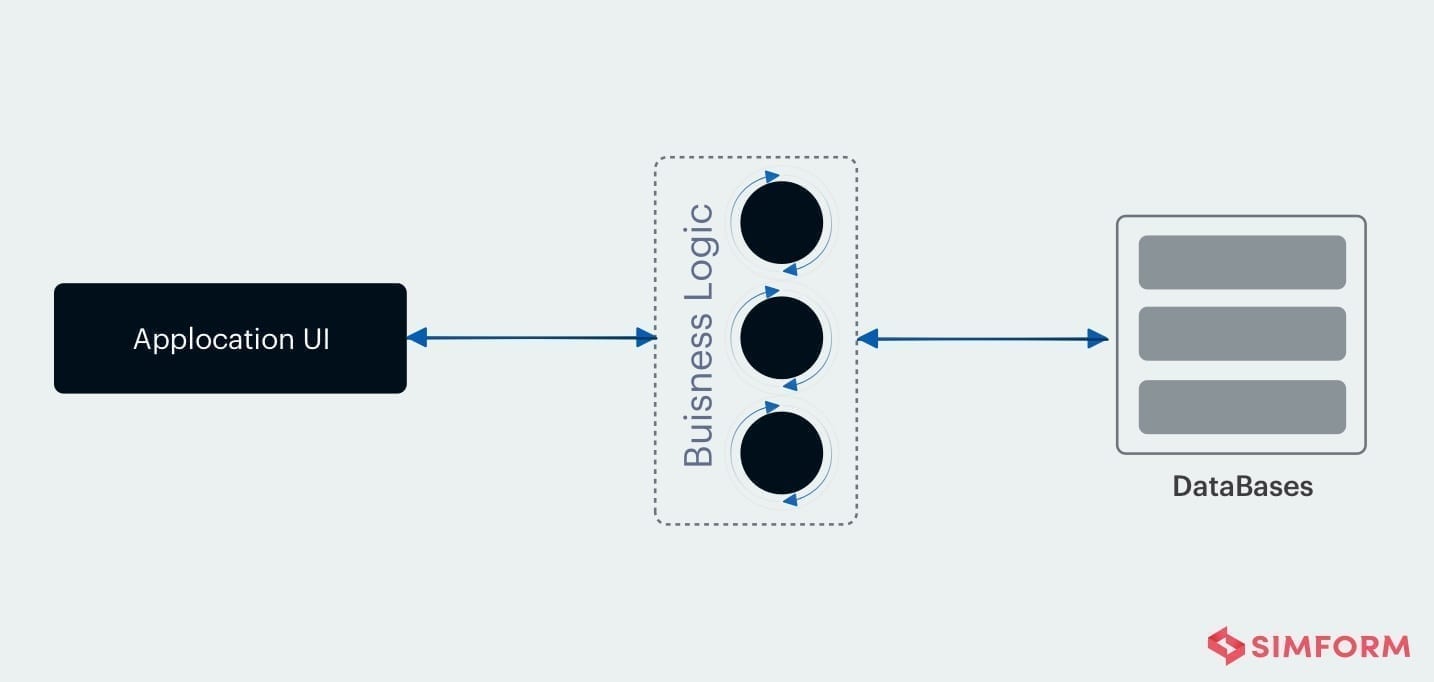
Node.js beautifully supports microservices architecture- a healthy pattern to build smaller, independent, and scalable services. It helps build apps with complicated and broad enterprise purposes.
Both Node.js and microservices architecture are suitable for each other. While Node.js can handle thousands of concurrent requests without compromising performance, microservices can create small modules for scalable apps; a great combination to build scalable and performant apps.
Due to its non-blocking I/O, event-driven architecture, and support for microservices, Node.js builds real-time streaming apps, networked and data-intensive apps.
Django
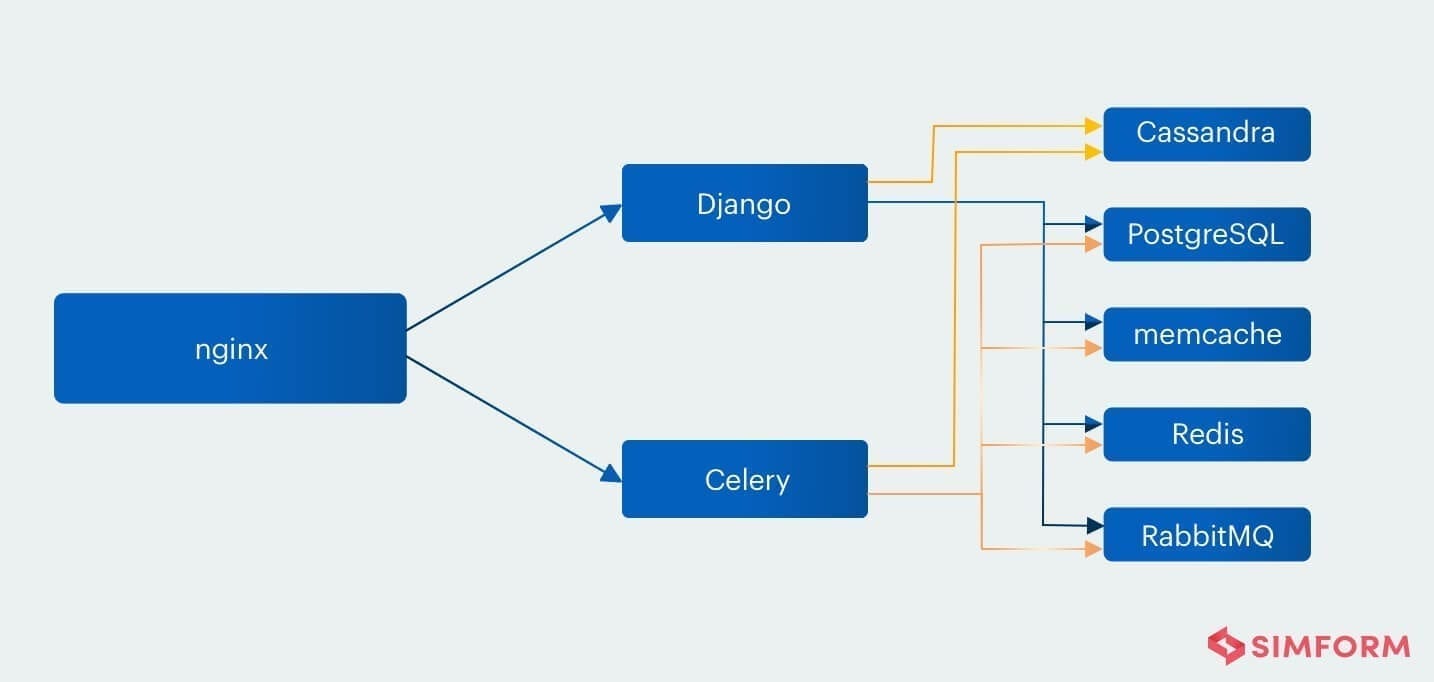
Though Django has certain restrictions to customize the apps and flexibility, it has an edge to build scalable apps because of its template fragment caching and availability of tools to handle data migrations such as performing heavy lifting of the application. It could be serving content, a large number of writes, and more types of apps.
Template fragment caching is a mechanism to cache the specific contents instead of re-rendering the block, which is the most sought-after requirement in scalable apps where so many operations and requests to be served in a short time.
Django could be used with any tech stack like Angular or Node.js to perform this heavy lifting of scalability data. So, Django is a favorable option to build highly scalable apps.
Scalability- Node.Js = Django
Node.js is superior in building robust, scalable apps and capabilities to handle thousands of requests, while Django, too, is excellent at handling thousands of requests and high-traffic apps. Both platforms are suitable for building scalable apps.
Performance of Node.js vs Django
The faster your web application, the higher the performance. Many things affect your web application’s performance, such as load times, code optimization, network configurations, server configurations, size, and data being passed to/from the server.
But when you compare the performance of tools like Node.js and Django, you should mainly consider the execution speed.
Node.js
When you have more resources, you can get the job done faster. When it comes to processing, more threads get tasks done more quickly. Though Node.js uses the event-loop model V8 Javascript engine to make the best use of single threads, it is not as fast as multiple threads.
Django
Django inherits Python’s high performance. The use of multiple threads helps increase performance. Django provides app caching and database optimization, further helping you improve the performance even more.
Performance- Django >Node.js
If you look at performance levels, Node.js has better concurrency and responsiveness compared to Django.
Full Stack Development using Node.js vs Django
Full-stack apps refer to the handling of frontend and backend development. Frameworks/platforms with expertise and better compatibility with other frontend frameworks are preferred in developing such apps.
The below comparison should portray Node.js and Django’s role in developing full-stack applications.
Node.js
Full-stack development refers to the front end and backend of a web application since Node.js is a server-side environment; it’s a back-end builder of web apps. Full-stack action could take place using Node.js with other frontend frameworks.
Django
Django is a python-based framework. It is considered for both frontend and backend development. So, full-stack apps could be built with Django.
Full stack development – Node.js = Django
Both Node.js and Django offer full-stack development capabilities. However, which one to choose depends on which programming language you are comfortable with JavaScript or Python.
Community/Dev tools for Node.js vs. Django
Node.js
Node.js has a good developer community. If you are using Node.js, you’ll find many tools created by other developers on GitHub for free. Additionally, you’ll receive a lot of help with your coding problems. Node.js community also looks at the new releases almost immediately and the updates are made available fast.
Django
Python has a fantastic developer community. We’ve always been impressed by how they come together to create new things and make them better. Today, you will find a Python tool/library for almost everything you can think of. But this does not apply to Django. The community for this framework is moderately active.
Community/Dev tools– Node.js > Django
Node.js has good developer community who contribute to the libraries, and help resolve coding issues for other members. On the other hand Django has a community which is not that active and lacks experienced developers.
Development freedom/time/cost when comparing Node.js vs Django
Development Freedom
We’ve already uncovered that Node.js gives you more freedom than Django when it comes to building web applications.
Development Time
If you are looking to build an application within shorter deadlines, Django is the right choice. You would need less time to make an application since Django has many in-built libraries and methods that help you with the necessary tasks and reduces repetition.
In contrast, Node.js would take more time to develop because you have to start it right from square one.
Development Cost
The development cost for Node.js and Django both depends on different aspects like application complexity, location, developer’s experience, and engagement model. One of the most common engagement models that companies follow is the time and material approach, where the developer’s fee is paid on an hourly basis.
This is where Django applications have an advantage over Node.js. It takes less time to develop Django apps due to ready-made templates and components. At the same time, Node.js development can take more time leading to higher development costs.
By now, you’ve got a pretty good idea of the features of Node.js and Django. After knowing all the uniqueness and difference, one natural question would be, “When to use what?”
By now, you’ve got a pretty good idea of the features of Node.js and Django. After knowing all the uniqueness and difference, one natural question would be “When to use what?”
Whether it is Node.js or Django, we are here to help you build high-performant web application.
Conclusion
Both Node.js and Django are special tools/platforms for building web-based applications. While Node.js is a server-side runtime environment, Django is a high-level python framework that could be used for backend and frontend development.
However, when it comes to choosing the right backend technologies for your web apps, it depends on specific project requirements.
So, you can choose Node.js when,
- You want to build a web application to stream content.
- You want to build a performant single-page application.
- You want to build web applications enriched with efficient data processing capabilities.
- You wish to create a real-time multi-user web application.
- You want to create browser-based game applications.
And choose Django if,
- Your project needs more features at a reduced development time.
- You want to develop a web app based on AI-based technologies.
- You need to develop new features on the fly.
- You want to create an app that can work across platforms.
- You are building a geographic-based application with extensive use of maps.
- You are creating custom software or an online application for business analytics.

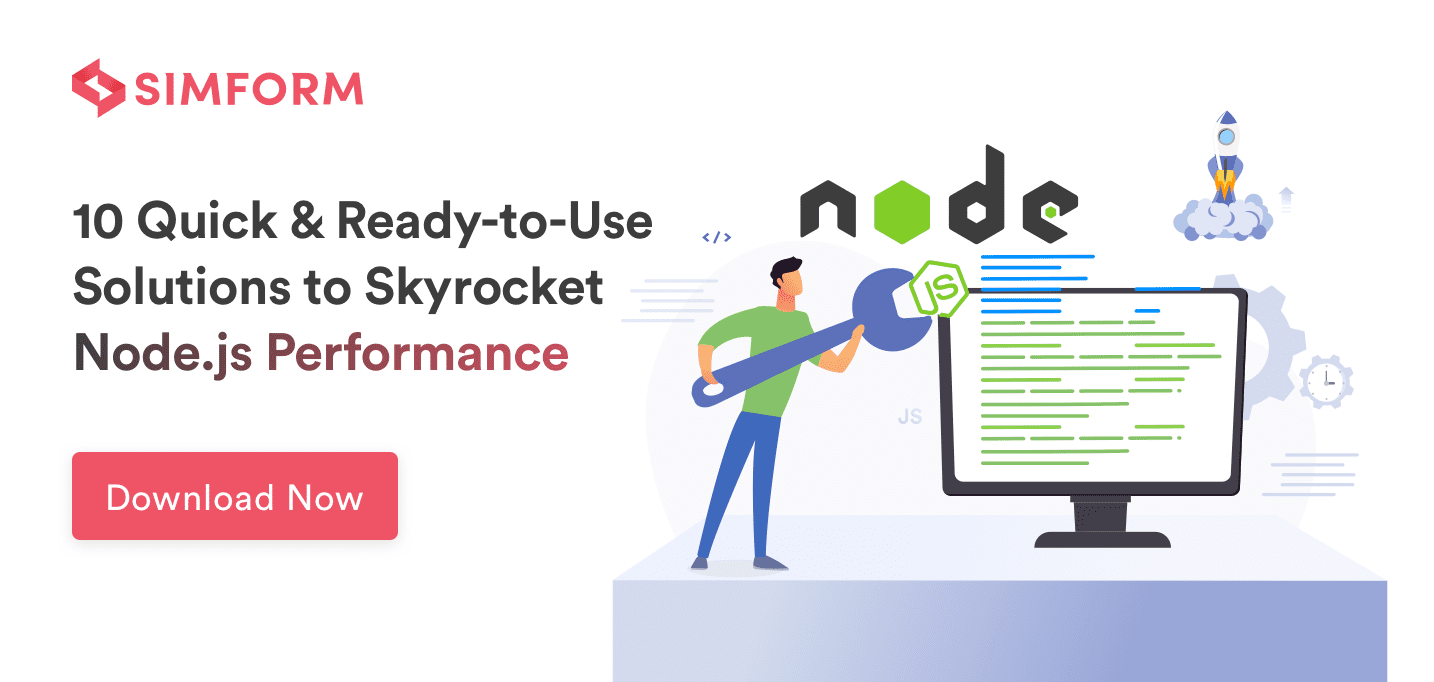
Shiva Manhar
Sir you have told everything is correct but you have not told about scientific calculation or machine learning. actually in my web application have required some machine learning. So can i move to Django and i am also good in python. please guide me. Thank you !
chisomprince
nice post
Jesse
Excellent article Tejas! I love how you broke down the "whys" rather than just saying one is better than the other in that category.